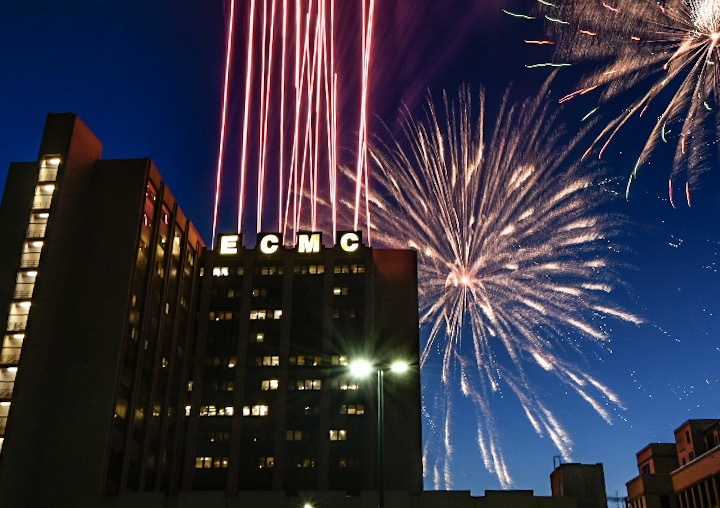
ECMC Celebrates a Century of True Care
1918 Opening of Buffalo City Hospital at Grider Street location Commemorated with
100-year Celebration Event
BUFFALO, NEW YORK – “Celebrating a Century of True Care” is the theme of the Erie County Medical Center Corporation celebration event held today for the hospital at 462 Grider Street that opened on March 19, 1918, as a public general hospital named the Buffalo City Hospital.
The hospital’s 100-year history is marked by three distinct phases corresponding to its three different names: (1) Buffalo City Hospital-21 years (1918-1939); (2) Edward J. Meyer Memorial Hospital-39 years (1939-1978); and (3) Erie County Medical Center-40 years (1978-2018). The original hospital consisted of three buildings of four floors each. Other buildings were added in successive years: three in 1922, an acute communicable disease building in 1923, a new psychiatric building in 1951, and the ECMC tower was erected in the 1970s.
ECMCC President and CEO Thomas J. Quatroche Jr., Ph.D. said, “We are honored and privileged in 2018 to commemorate the 100th anniversary of the hospital, recognizing all of the thousands of remarkable physicians, nurses and support staff who established the Buffalo City Hospital, nurtured it through the era of Meyer Memorial Hospital and today have continued the tradition at ECMC of delivering quality health care services for every patient who comes into our care. Ours is a remarkable history, punctuated by groundbreaking medical care and cutting-edge medical education that distinguish ECMC as a leading hospital for our region, state and beyond. We are pleased and honored to celebrate ECMC’s tremendous historical legacy.”
The then new Buffalo City Hospital included 415 beds and the resources to provide special care for tuberculosis patients and those with acute communicable diseases. And so began the century of health care services being delivered from ECMC’s campus on the East Side of the City of Buffalo. In planning for the future hospital in 1916, the architects Green & Wicks wrote in the publication The Modern Hospital, “The ideal hospital…will be so arranged, constructed, and administered as to make each patient realize on leaving that [their] stay has been made as comfortable and pleasant as possible”-a philosophy of care practiced each day by ECMC Corporation staff members throughout the organization and emphasized in its tagline-the difference between healthcare and true care™.
The former 82-acre West Farm was transformed into what eventually became Erie County Medical Center Corporation’s current ECMC Health Campus. In recent years, new structures have been added, including the following buildings/years opened: Ambulatory Center (2011); Terrace View Long-Term Care Facility (2013); and Behavioral Health (2014).
ECMC is now home to the region’s only Level 1 Adult Trauma Center, Centers of Excellence for Behavioral Health, and Transplantation and Kidney Care, as well as Centers for Orthopaedic Care, Rehabilitation, Head and Neck Oncology, Bariatrics and myriad specialty care services, including neurology, urology, dentistry, burn treatment, general surgery and gastroenterology.
A Commemorative 100th Anniversary History Book was presented to those in attendance during today’s Centennial Celebration. Numerous photographs and historical information published in the book in great detail document the hospital’s 100 years. An included timeline provides such milestones in ECMC history as:
- In 1918, Buffalo was the vibrant city in which the hospital that became ECMC opened in 1918 as the Buffalo City Hospital. The year 1918 was also one of the most medically perilous times in the history of city and the world. The devastating diseases of smallpox and tuberculosis were already rampant when the influenza pandemic arrived during the same year.
- By 1919, the Buffalo City Hospital School of Nursing was founded. It was the first diploma nursing school in Buffalo to include university courses, racially integrate students, and admit men. In the 1930s, the School became affiliated with the University of Buffalo, and the then newly named Edward J. Meyer Memorial Hospital School of Nursing Alumni Association.
- In a very short time, the hospital originally conceived as a TB sanitarium became one of only 12 of 7,000 in the nation to treat all diseases. It had also become one of the leading teaching facilities in the country, providing training for physicians, dentists, nurses, and dieticians.
- Buffalo City Hospital’s three-year residency program in medicine begins in 1930. Also in the 1930s, the hospital received the full and unqualified approval of the American College of Surgeons as being acceptable for graduate training in surgery and surgical specialties.
- In 1965, the Intensive Care Unit opens to provide highly concentrated medical and nursing care.
- Meyer Memorial’s Anita Dorr, R.N., designs the first crash cart in her basement in 1968. Designed to hold all the most essential tools and drugs needed in a medical crisis, today’s crash cart is used universally in Emergency Departments.
- Thanks to its high standards of care, ECMC is named the region’s designated trauma center in 1989.
- In 2004, the ECMC Healthcare Network becomes an autonomous health system as a not-for-profit public benefit corporation and is renamed the Erie County Medical Center Corporation (ECMCC).
- To make health care more efficient, improve quality, avoid duplication of medical services and make them more accessible, ECMCC and Kaleida Health join forces in 2008 to create the Great Lakes Health System of Western New York, which also includes the University at Buffalo and The Center for Hospice & Palliative Care.
ABOUT ERIE COUNTY MEDICAL CENTER (ECMC) CORPORATION: The ECMC Corporation was established as a New York State Public Benefit Corporation and since 2004 has included an advanced academic medical center with 583 inpatient beds, on- and off-campus health centers, more than 30 outpatient specialty care services and Terrace View, a 390-bed long-term care facility. ECMC is Western New York’s only Level 1 Adult Trauma Center, as well as a regional center for burn care, behavioral health services, transplantation, medical oncology and head & neck cancer care, rehabilitation and a major teaching facility for the University at Buffalo. Most ECMC physicians, dentists and pharmacists are dedicated faculty members of the university and/or members of a private practice plan. More Western New York residents are choosing ECMC for exceptional patient care and patient experiences-the difference between healthcare and true care™.

